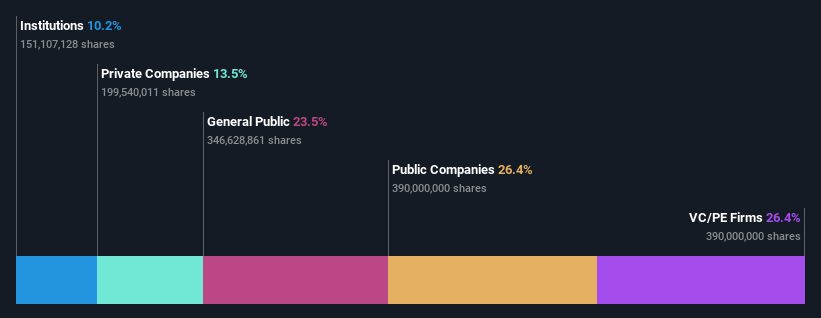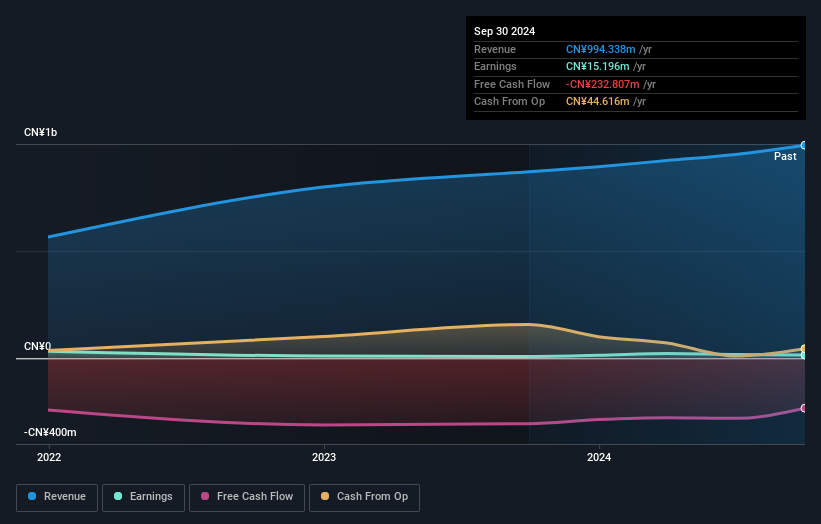GrandiT Co., Ltd.'s (SHSE:688549) market cap dropped CN¥783m last week; Public companies bore the brunt

Key Insights
- Significant control over GrandiT by public companies implies that the general public has more power to influence management and governance-related decisions
- 53% of the business is held by the top 2 shareholders
- Institutional ownership in GrandiT is 10%
If you want to know who really controls GrandiT Co., Ltd. (SHSE:688549), then you'll have to look at the makeup of its share registry. And the group that holds the biggest piece of the pie are public companies with 26% ownership. In other words, the group stands to gain the most (or lose the most) from their investment into the company.
And following last week's 5.3% decline in share price, public companies suffered the most losses.
Let's take a closer look to see what the different types of shareholders can tell us about GrandiT.
See our latest analysis for GrandiT

What Does The Institutional Ownership Tell Us About GrandiT?
Institutions typically measure themselves against a benchmark when reporting to their own investors, so they often become more enthusiastic about a stock once it's included in a major index. We would expect most companies to have some institutions on the register, especially if they are growing.
We can see that GrandiT does have institutional investors; and they hold a good portion of the company's stock. This suggests some credibility amongst professional investors. But we can't rely on that fact alone since institutions make bad investments sometimes, just like everyone does. When multiple institutions own a stock, there's always a risk that they are in a 'crowded trade'. When such a trade goes wrong, multiple parties may compete to sell stock fast. This risk is higher in a company without a history of growth. You can see GrandiT's historic earnings and revenue below, but keep in mind there's always more to the story.

GrandiT is not owned by hedge funds. Our data shows that Zhejiang Juhua Co., Ltd. is the largest shareholder with 26% of shares outstanding. For context, the second largest shareholder holds about 26% of the shares outstanding, followed by an ownership of 7.3% by the third-largest shareholder.
After doing some more digging, we found that the top 2 shareholders collectively control more than half of the company's shares, implying that they have considerable power to influence the company's decisions.
Researching institutional ownership is a good way to gauge and filter a stock's expected performance. The same can be achieved by studying analyst sentiments. Our information suggests that there isn't any analyst coverage of the stock, so it is probably little known.
Insider Ownership Of GrandiT
While the precise definition of an insider can be subjective, almost everyone considers board members to be insiders. Management ultimately answers to the board. However, it is not uncommon for managers to be executive board members, especially if they are a founder or the CEO.
Insider ownership is positive when it signals leadership are thinking like the true owners of the company. However, high insider ownership can also give immense power to a small group within the company. This can be negative in some circumstances.
Our data cannot confirm that board members are holding shares personally. Not all jurisdictions have the same rules around disclosing insider ownership, and it is possible we have missed something, here. So you can click here learn more about the CEO.
General Public Ownership
With a 23% ownership, the general public, mostly comprising of individual investors, have some degree of sway over GrandiT. This size of ownership, while considerable, may not be enough to change company policy if the decision is not in sync with other large shareholders.
Private Equity Ownership
With a stake of 26%, private equity firms could influence the GrandiT board. Some investors might be encouraged by this, since private equity are sometimes able to encourage strategies that help the market see the value in the company. Alternatively, those holders might be exiting the investment after taking it public.
Private Company Ownership
We can see that Private Companies own 14%, of the shares on issue. Private companies may be related parties. Sometimes insiders have an interest in a public company through a holding in a private company, rather than in their own capacity as an individual. While it's hard to draw any broad stroke conclusions, it is worth noting as an area for further research.
Public Company Ownership
Public companies currently own 26% of GrandiT stock. We can't be certain but it is quite possible this is a strategic stake. The businesses may be similar, or work together.
Next Steps:
While it is well worth considering the different groups that own a company, there are other factors that are even more important. Case in point: We've spotted 2 warning signs for GrandiT you should be aware of, and 1 of them can't be ignored.
If you would prefer check out another company -- one with potentially superior financials -- then do not miss this free list of interesting companies, backed by strong financial data.
NB: Figures in this article are calculated using data from the last twelve months, which refer to the 12-month period ending on the last date of the month the financial statement is dated. This may not be consistent with full year annual report figures.
New: Manage All Your Stock Portfolios in One Place
We've created the ultimate portfolio companion for stock investors, and it's free.
• Connect an unlimited number of Portfolios and see your total in one currency
• Be alerted to new Warning Signs or Risks via email or mobile
• Track the Fair Value of your stocks
Have feedback on this article? Concerned about the content? Get in touch with us directly. Alternatively, email editorial-team (at) simplywallst.com.
This article by Simply Wall St is general in nature. We provide commentary based on historical data and analyst forecasts only using an unbiased methodology and our articles are not intended to be financial advice. It does not constitute a recommendation to buy or sell any stock, and does not take account of your objectives, or your financial situation. We aim to bring you long-term focused analysis driven by fundamental data. Note that our analysis may not factor in the latest price-sensitive company announcements or qualitative material. Simply Wall St has no position in any stocks mentioned.
About SHSE:688549
GrandiT
Researches and develops, produces, and markets electronic chemical materials for the semiconductor industry in China.
Proven track record with adequate balance sheet.


